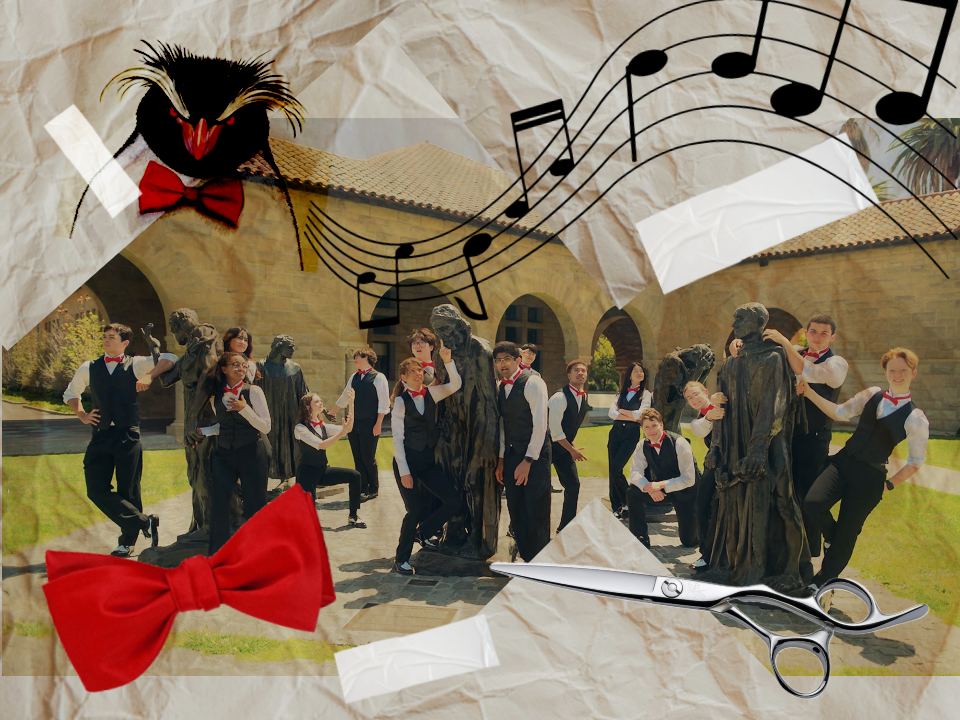“Campus Obscura” highlights the many student groups at Stanford and the communities that take root on The Farm.
Stanford Talisman wears colorful scarves. The Mendicants don bright red coats. The Harmonics rock leather jackets, black lipstick and eyeshadow to match. When it comes to iconic aesthetics, Stanford a cappella groups are blessed in spades.
The Stanford Fleet Street Singers — always found in sleek tuxedos and red bowties — are no exception. A photo on their website features the group clad in this semi-formal dress, posing around Main Quad next to the agonized Rodin statues. Perhaps that is as good an introduction to the group as any. Yet, to linger on the charms of their bespoke attire in a still image is to only scratch the surface of what makes Fleet Street stand out among their musical peers.
In 1981, the group got its start singing Stanford fight songs like “Hail, Stanford, Hail” and “Come Join the Band” in barbershop arrangements, which are often characterized by four part harmonies consisting of tenor, bass and baritone parts. In the years since, Fleet Street has evolved, but remained committed to depicting the Stanford experience through a barbershop — this time, with comedic original songs.
“Normally it will come from, you know, a dumb idea. [Like] ‘Everyone Pees in the Shower.’ That’s probably one of our most famous songs,” said current music director Emily Mannion ’27. “So you come up with the idea of a universal experience that, okay, everyone probably pees in the shower — let’s just make a song about it.”
Today, the group boasts a discography full of original songs written by members past and present, taking inspiration from the chord structures and harmonies one might find in a 1920s barbershop quartet. Every year, the music director gets to choose from Fleet Street’s vast catalog and decide what to perform.
Not all songs fit the bill — some have outdated humor, while others must be rearranged to account for sopranos or altos, which Fleet Street began to allow in 2021 to expand their formerly all-male roster. A few, however — such as the fan-favorite tune “All-Nighter” — have topics that will likely prove relevant for decades to come. And if the songs alone were not enough to satiate one’s appetite for relatable comedy, the group also dabbles in skits and humorous short films.
The Fleet Street machine operates to the tune of four practices a week, two hours each. Yet, for the members, the time commitment is not a burden.
“It’s not just a music club, it’s almost like a social group,” said former Fleet Street President Joshua “JC” Chien ’23. ”We make that very clear during the auditions that this group is not just any group — we put energy in it. We put effort in it, with that it … builds our bond together.”
In addition to frequent practices, the members are linked together with a myriad of initiation and performance traditions. One well-known example is the “run-on,” in which members frantically run around the stage before every performance while “screaming our heads off,” as Chien said.
“That’s something that somebody new to the group will have to adjust to, because it is not easy to sing when you’re out of breath,” he said. “They have to improve their cardio.”
The one exception to the run-on rule? The memorial of John Arrillaga.
“We were like, ‘We can’t run-on. It’s a memorial’,” Chien recalled. “Not usually a part of our repertoire.”
Mr. Arrillaga was made a fan of the group when they performed for him a decade ago. Since then, Fleet Street’s all-original barbershop appeal has continued amassing audiences across campus, in addition to holding together a community of singers through a culture of pure goofiness.
“Our tagline, oftentimes, is [that] we’re a bunch of people who take our music very seriously and ourselves very unseriously,” Mannion explained. “I think that’s something that has been very prominent for all of the years of Fleet Street.”
